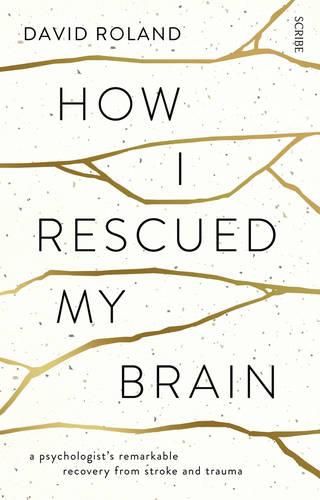Readings Newsletter
Become a Readings Member to make your shopping experience even easier.
Sign in or sign up for free!
You’re not far away from qualifying for FREE standard shipping within Australia
You’ve qualified for FREE standard shipping within Australia
The cart is loading…






As a psychologist specialising in court assessments, David Roland often saw the toughest, most heartbreaking cases. The emotional trauma had begun to take its toll - and then the global financial crisis hit, leaving his family facing financial ruin.
So when he found himself in a local emergency ward with little idea of where he was or how he got there, doctors wondered if he had had a nervous breakdown - if the strain of treating individuals with mental-health problems had become too much. Eventually they discovered the truth: David had suffered a stroke, which had resulted in brain injury. He faced two choices: give up or get his brain working again.
Drawing on the principles of neuroplasticity, David set about re-wiring his brain. Embarking on a search that brought him into contact with doctors, neuroscientists, yoga teachers, musicians, and a Buddhist nun, he found the tools to restore his sense of self: psychotherapy, exercise, music, mindfulness, and meditation.
How I Rescued My Brain is the story of David’s neurological difficulties and his remarkable cognitive recovery. It is also an account of a journey to emotional health and wellbeing. In the tradition of Marc Lewis’s Memoirs of an Addicted Brain and Jill Bolte Taylor’s My Stroke of Insight, this is an amazing tale of one man’s resilience, and his determination to overcome one of the most frightening situations imaginable - the fear that he had lost his mind, and might not get it back.
$9.00 standard shipping within Australia
FREE standard shipping within Australia for orders over $100.00
Express & International shipping calculated at checkout
As a psychologist specialising in court assessments, David Roland often saw the toughest, most heartbreaking cases. The emotional trauma had begun to take its toll - and then the global financial crisis hit, leaving his family facing financial ruin.
So when he found himself in a local emergency ward with little idea of where he was or how he got there, doctors wondered if he had had a nervous breakdown - if the strain of treating individuals with mental-health problems had become too much. Eventually they discovered the truth: David had suffered a stroke, which had resulted in brain injury. He faced two choices: give up or get his brain working again.
Drawing on the principles of neuroplasticity, David set about re-wiring his brain. Embarking on a search that brought him into contact with doctors, neuroscientists, yoga teachers, musicians, and a Buddhist nun, he found the tools to restore his sense of self: psychotherapy, exercise, music, mindfulness, and meditation.
How I Rescued My Brain is the story of David’s neurological difficulties and his remarkable cognitive recovery. It is also an account of a journey to emotional health and wellbeing. In the tradition of Marc Lewis’s Memoirs of an Addicted Brain and Jill Bolte Taylor’s My Stroke of Insight, this is an amazing tale of one man’s resilience, and his determination to overcome one of the most frightening situations imaginable - the fear that he had lost his mind, and might not get it back.
Through his work as a forensic psychologist, David Roland spent years grappling with matters of the mind. Indeed, the emotional pressure of supporting his patients in their mental-health problems coupled with personal and financial stresses led to Roland’s own struggles with anxiety and depression. When he finds himself in an emergency ward, with no idea how he got there or why, it seems likely that he’s suffered a nervous breakdown.
That Roland had in fact suffered a stroke, and resulting brain injury, proved far scarier. Faced with the fear that he has lost his mind, and might not get it back, Roland’s journey to recovery sees him engaging with both medical and spiritual experts and strategies: doctors, neuroscientists, psychotherapists, yoga teachers and a Buddhist nun, to name just a few.
While Roland’s breadth of research is ambitious, what he offers is accessible, often moving and always personal. His experiences shape the narrative arc of the memoir, but How I Rescued My Brain is more than just one man’s story of remarkable cognitive recovery. Roland offers an impressive translation of psychology and neuroscience for a lay audience. This thoughtful book works to reframe our view of how minds work more broadly, and how we come to terms with who we are. Roland hopes to provide insights and inspiration for readers, regardless of what their journey to emotional wellbeing entails.
Despite his academic background, it’s Roland’s vulnerability that keeps his memoir emotionally intelligent and engaging. Even the books cover design, featuring kintsukuroi, a Japanese technique of repairing pottery with gold or silver lacquer, evokes a lovely metaphor: ‘the understanding that the piece is more beautiful for having been broken’.